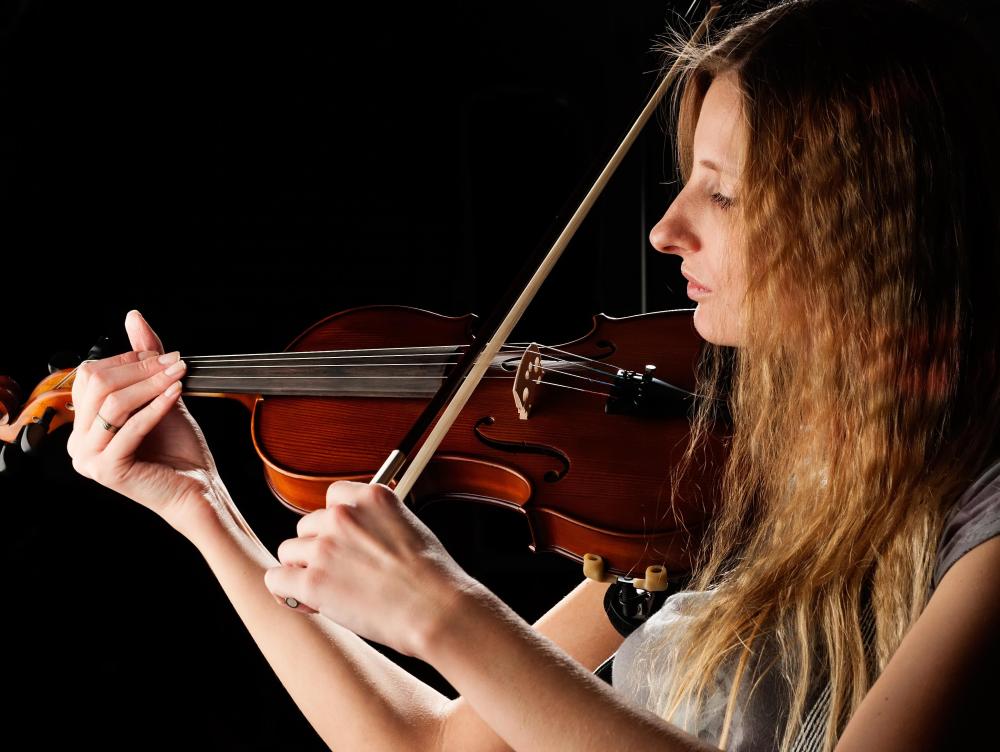At PracticalAdultInsights, we're committed to delivering accurate, trustworthy information. Our expert-authored content is rigorously fact-checked and sourced from credible authorities. Discover how we uphold the highest standards in providing you with reliable knowledge.
What does a Music Conductor do?
Music conductors are responsible for keeping musicians on track during a performance. A music conductor can have several jobs, depending on the size of the organization, but his primary job is to guide a group of musicians through their musical performances using hand-based signals that indicate parts of the music, like beat and dynamics. Depending on the type of musical group, the conductor may carry tools to help him indicate parts in the song, or he may do it only by hand. In some organizations, the music conductor is also the band leader. Beat indicates the tempo, or speed of a piece, and dynamics are how loud a part or piece should be played.
Usually, a music conductor stands in front of the performing musicians facing them. When a musical performance begins, he gives the performers a signal that tells them how fast the piece will be played and when to start. They generally count down a partial or whole measure to indicate tempo to the musicians before initiating performance of a piece. When a musical piece is being played, a conductor will usually keep a steady beat with one hand while using the other hand to indicate messages to the musicians, such as when musicians should play and when they should cut off long notes. Often, a conductor will point at a musician when his turn to play a musical solo has come.

In some organizations, a music conductor is an all-around leader of the band, and is responsible for organizing the group, choosing musical selections, and conducting practice. Other times, a conductor may be simply a conductor, responsible only for the hand signals that keep the beat during performances and practice. Often, a marching band will have two musical conductors because it makes the conductors more visible to performers from another angle. A musical conductor can use a few conducting tools, including batons and maces, to articulate his hand signals to the members of the musical group.

A baton is the general name for any kind of conducting stick, while a mace is a long stick with a heavy ball at the end. Both maces and batons can be spun and thrown for entertainment purposes, but this is usually restricted to marching band performances. In a marching band, the music conductor is often called the drum major.
What a conductor wears during a performance depends largely on the type of musical organization he conducts. A musical conductor guiding a classical orchestra will often dress in formal wear, like a tuxedo. Conductors in marching band often wear uniforms similar to the rest of the marching band, but sometimes wear formal wear like dresses and tuxedos, at the discretion of the band leader. Jazz band conductors usually function as leaders of their bands as well as conductors, so they usually dictate their own style of dress as well as the style of dress for the band members.
AS FEATURED ON:
AS FEATURED ON:













Discussion Comments
It's easy to believe a conductor isn't all that important if the musicians are well rehearsed, but an orchestra without a conductor would fall apart quickly. Tempo is a difficult thing to maintain on your own, for one thing. If one section started speeding up, then the other musicians might feel the need to keep up with it. A good conductor keeps the tempo steady with one hand.
There are also times when a soloist or a percussionist needs to come in on a very specific beat. They rely on a conductor to point out the exact time to start an aria or strike a gong. I couldn't picture being in a large musical ensemble of any kind without a conductor.
Post your comments